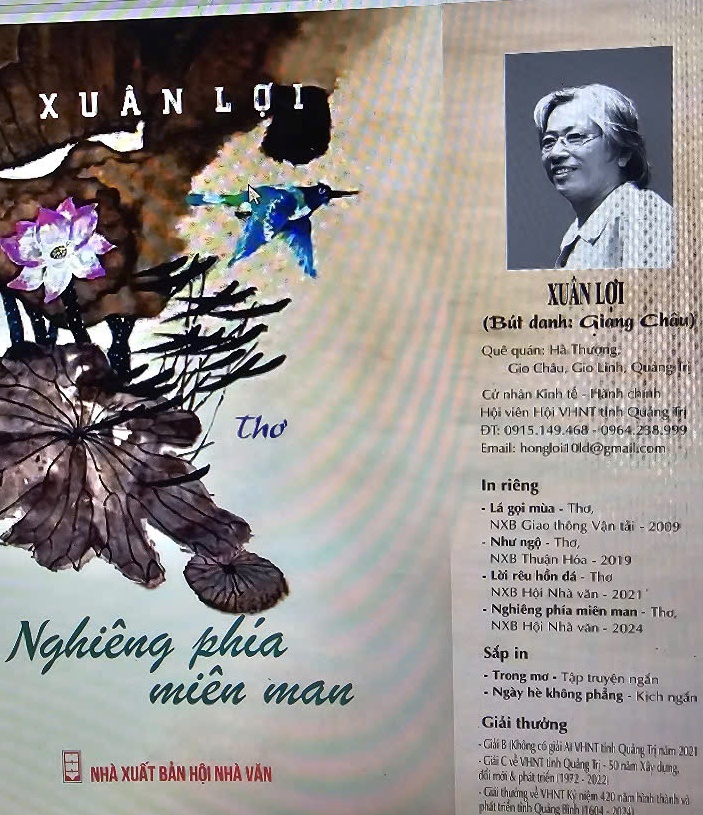No, it is not because of the name of the poetry collection that I named this article like that. But it is also true, because the verse "nghien to the endless" has become a symbol for me to recognize the soul and emotions of the author of the poetry collection. Xuan Loi does not seem to write poetry, but he borrows words to let the vibrations of his soul flow into rhyme. And Xuan Loi's soul is very easily moved, resonating before any manifestation of life. It seems that wherever he looks, he tries to find a way to rhyme and call poetry. That poetry is that person, this verse can be applied to Xuan Loi. He calls his poetry "sip in confusion" and I think it is correct. Xuan Loi's poetry is simple and sincere.
Let's read his private poems, that is, the poems he wrote from his family life, from himself. Xuan Loi wrote about his mother who was widowed at the age of twenty, living alone for sixty years as a daughter-in-law, remembering her mother feeding her child with her lips until now . The first half of the poem "feeding her child with her lips" is remembering the scene of her mother raising her when she was young in the traditional way of Vietnamese rural mothers, the second half "feeding her child until now" is seeing herself after sixty years of life still being a child in her mother's eyes, still having to rely on her care.
In the year 2019, he wrote "Tu tinh" as a self-portrait.
The joys and sorrows of civil servants are unpredictable.
Worried and anxious... oh
Whispering "Dancing is called" playing
Send soul number message to spirit....
“Dancing is called” is the way the author reads the name of his previous poetry collection “Leaves call the season”. But those three words read in reverse express the state of mind of a civil servant in the system, dancing is called living in life. The body is attached to the desk every day, to the accounting profession, the self-deprecating verse can make you laugh, the wrong way up and down , and the soul is left in the place of the message minh linh . The author uses these two words “minh linh” in several places in the poetry collection, explaining it is vague, but reading it again also feels vague. Well, “ay oi” means ai oi, you will understand the heart of the person who calls out. “Em oi co bao nhieu sau doi nam cuoc doi” is the lyrics of a song that has resonated in people’s hearts for so long, so Xuan Loi’s poem is also sad like that : The ups and downs of fate / Sixty years of one’s life is so fleeting .
The poem whose title is used as the title of the collection Xuan Loi describes the father's feelings for his daughter studying at the medical school. Just two lines : I study hard because I love my mother the most / I don't do anything out of the blue because I'm afraid my father will be sad, expressing both the parents' love and the child's personality. The father's love for his child is expressed very specifically and very truly, and reading it makes me feel moved:
Dad pampers and loves every meal
Worrying about not having enough fish
Girls love sour soup with star fruit and bamboo shoots
Call every few days to ask about your child.
But a father's love for his daughter is not only about food and drink when he is away from home. Xuan Loi concludes the poem with his worries about his daughter's life. When the children leave their parents' arms to go out into the world, into society, the parents are both happy and worried. The worries turn into thoughts. The thoughts of not knowing how to help their children, of not being able to hold their hands and lead them like when they were young, turn into a lingering, aching feeling in their minds. The daughter is dreamy and impulsive / Turning over, the father leans towards her endlessly . The last four words of the last line of the poem express in poetry the father's haunting feelings, and the reader of the poem is haunted by these feelings from then on.
It is also the heart of a father but the ultimate pain of a father who lost his son. The poem "Fall apart" by Xuan Loi holds back his tears, his sobs of regret for his son, his pain for himself before the scene of "green leaves falling, yellow leaves remaining", looking at the picture of his son on the altar, the world and the living are separated. The image of a bottle and shadow hears and speaks but does not say a word . Xuan Loi's endless leaning is leaning towards such feelings of fate. Endlessly immersed.
From his own fate, Xuan Loi touches the fates of others, like the soldiers who crossed the Thach Han River years ago to see the river now as a river cemetery: At night, I was lost in the red river / The river cemetery has no graves / The name of the river . Many people have written about the tragic and heroic Thach Han River during the 81 days and nights of fighting to defend the Quang Tri Citadel with many heart-wrenching verses. Xuan Loi contributes to that a youthful, clear-eyed sister who is now standing by the river cemetery looking at something with water in the distance . That is enough to absorb the price of yesterday's victory and today's peace. Having been a soldier himself, Xuan Loi is sensitive to the sacrifices of his comrades not only in wartime but also in peacetime. He wrote a poem for his young comrades who sacrificed their lives while helping the people of Central Vietnam during the fierce storms and floods of the past few years, with the scene: I scream out in longing for the immense sea and waves / Europe waits, strangely familiar , waiting for her husband to turn to stone/ Which cemetery can count the love of the green forest shedding its leaves/ Which museum can measure the tears of the night, my husband!
Xuan Loi studied finance and accounting at university. After graduating, he became friends with numbers and calculations from the Binh Tri Thien Department of Industry to the Department of Fisheries and then the Quang Tri Department of Agriculture until his retirement in his hometown. The boring life of a civil servant was mentioned in his poems with self-mocking verses like in the poem quoted above.
But that is the office man within the four closed walls. As for the emotional man, the poet in Xuan Loi, when going out, coming to the works of his profession, he easily feels moved by affection. But in this poetry that I call "writing outside of himself", Xuan Loi often has not reached himself in his poetry.
Here, the rambling sometimes makes him ramble in his poems, especially in the poems he writes about things outside, on a certain occasion. Commemorative poems are not unworthy of writing, cannot be written well, but the poet can only write well when his emotions are mature enough, not depending on external reality but on the maturity of his soul's emotions.
The poems that stand out in this collection of poems by Xuan Loi are those when the author writes from the resonance of the soul before reality. The reader does not know and does not need to know where this scene is, who that person is, what that event is, only knowing that the poet's soul has vibrated in the rhyme of the words, making his soul vibrate as well.
The lingering in Xuan Loi's poetry is like that, so it is necessary to be of love, not of narrative. If I could, I would like his poetry to remain lingering and "vague" (the name of a poem in the collection) of the soul. Like in the poem he wrote about the wedding of a daughter of Thu who married a coastal man in Ha Long, the last two lines can condense the love: The old shore, the waves are drunk, forever embracing and kissing / The sea lapping at the shore, hugging the sand, singing with love .
The wandering poetry also easily makes the poet feel suspended, and the poem "Suddenly Forget" is the poem that can best represent the soul of Xuan Loi's poetry. The sudden states of "silence, listening, sadness, pleasure, love, pain, craving, jealousy, resentment" after the word "suddenly" are concrete expressions of longing, regret, and sorrow. They are the high notes of the love melody, so when all those states are withdrawn into "Suddenly Soul", they fall into a low note "Suddenly Forget". The six-eight verse form here adds musicality to the poem, making the soul and love even more suspended, so the poem seems gentle but lingering. Speaking of the six-eight verse of Xuan Loi's poetry, we can also mention the poem "Brown Hair One Person". The poem starts with the midday sun but ends with the full moon night. Perhaps the author let the endless flow of emotions lead him, or perhaps the author wanted to talk about the areca tree at two different times to express the meaning of the poem. I was startled when I read the verse "Full breasts, round and full of love" because I had never seen anyone describe the areca leaf or compare a young woman's breasts to the areca leaf so lustfully. Reading Xuan Loi's poems, I was sometimes startled and delighted to savor the unexpected comparisons without the word "like". Let's read these two more verses: Knowing you when the rice was ripe, you were a girl / The scent of the fields, full of milk, full of love (Hesitating, moved to tears).
Xuan Loi's wandering and floating soul easily lets the verses stretch out and flow, sometimes with words intertwined and rolled together. It seems that this is the author's way of creating musicality for the verses to express his feelings. Therefore, the poem's essence is sometimes in the music, not in the meaning. Is that why some musicians have found inspiration in his poems to compose them into songs and music, and the song "Nho hoai song trang" written about the Nhat Le River ( Quang Binh ) is a typical example. Read the poem "Hoa Mua" to see Xuan Loi's way of creating musical poetry. Using the Nam Kau poem, in one sentence, he repeats the wordplay "hoa mua who sells and buys". But the whole poem is a melody of love for flowers, drunk with flowers, drunk with love, with words that are so loose that just reading one has to follow the rhythm and music of the verse:
Purple drops of mua flowers fill my eyelids
The golden scent wafts like a bee's hovering back.
Who sells and wants to buy?
The wildflower season is not easy to be more brilliant than the other.
Soft lipstick is more afraid of fading than lasting...
Xuan Loi often puts these long, rambling sentences at the end of the poem to conclude and open up, to create a lingering, humming feeling. The tone is flat, the tone is heavy, and the rhymes are connected in a sentence, so the author often uses them. And when reading such sentences and poems by Xuan Loi, do not use logic to infer or compare. It's poetry!
Multi-colored rainbow, fragile clouds, blushing cheeks
The cool fragrance of the night flowers accentuates the sweet fruit on the branches .
(Night-blooming)
Spring afternoon flowers and sunlight lull people.
Waiting to cry
The shimmering shadow momentarily vaguely...
fell off!
(It fell sideways)
Eyes exchanged more than a thousand times of love
Love is lost, heart is hesitant forever!
(Forever in thought)
But sometimes Xuan Loi plays with poetic style. Like in the poem "De gi nhu song" in the last stanza, he combines the first words of the bold lines into a meaningful sentence, and the whole stanza rhymes with a flat rhyme.
As easy as a wave
I just realized how painful it is to love you!
Just knew how delicious pink lips are for the first time!
I just fell in love with you so foolishly!
Just realized how much I miss our date...
Or again, Xuan Loi has a poem that makes me shiver when I read it. The poem describes a girl in the poet’s eyes, whose words and images show that she is beautiful, beautifully beautiful. She is also a beautiful girl in the spring scene. Reading the first four lines talking about eyes, lips, cheeks, hair, I think that just looking at her makes me want to fall in love. But then the author drops a final sentence that makes the reader stunned. Her figure. Too much! Creepy... What is “Nhin” that when you look too much, the person looking at her beauty feels creepy? And the last two words of the final sentence are used as the title of the poem.
Spring sunshine drifts low across
Fragile as she longs for love
Beautiful peach cheeks
Fragrant lips, eyes, hair like clouds...
Figure. So creepy.
Xuan Loi's poetry is so endless. Sometimes he is simple and rustic. Sometimes he has unexpected and delicate verses and ideas. It seems that he has made his own choice when coming to literature, entering the realm of poetry. He considers literary words important, not the type of writing empty words . Poetry for him is not trying to scream and express regret , not feeling like painting pity , not straining oneself to show sadness and tragedy. The poet must find the right words and the right words of literary words, that is, to be honest, honest with himself and honest with others. Honest from the heart, not borrowed, embellished, or painted.
Sadness stops the drama
What words are literary?
Having determined for himself such a poetic way of life, I believe Xuan Loi will continue to wander with poetry and a life full of love.
Hanoi, August 27, 2024
Pham Xuan Nguyen
Source: https://baoquangtri.vn/mien-man-xuan-loi-189991.htm



































































































Comment (0)